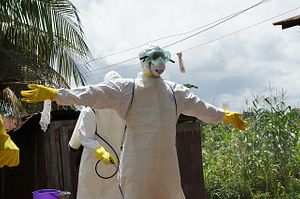Since March, the Ebola virus – the most lethal viral disease known to humankind – has been spinning out of control in West Africa. Thus far, nearly 5,000 suspected and confirmed cases, including about 2,500 fatalities, have been reported, making this outbreak the largest in history.
China has responded to the epidemic with unprecedented generosity. In August, it dispatched three teams of infectious disease experts to assist local medical professionals and sent $5 million worth of medical supplies to the three most affected countries (Sierra Leone, Liberia, and Guinea). Last week, it announced that it would provide additional $32 million worth of humanitarian aid to the affected countries. And earlier this week, a 59-member Chinese laboratory team departed for Sierra Leone to help the country improve lab testing capacity, joining the 115 Chinese medical staff that are already on the ground. The WHO welcomed China’s new commitment, calling it “a huge boost, morally and operationally.”
With a total pledge of $38 million, China’s assistance has been dwarfed by the $175 million given by the United States. But that has not deterred the state media from highlighting China’s role in reining in the epidemic. While emphasizing the heroism of Chinese medical teams and “selflessness” of the humanitarian aid, it also touted the country’s “rich” experience and expertise in fighting major disease outbreaks. Apparently ignoring the Chinese cover-up and inaction during the 2003 SARS outbreak, the official Xinhua News Agency quoted WHO officials who said African countries could learn from China’s experience in addressing the 2013 outbreak of the Avian flu strain labeled H7N9 as well as from its successful investment in public health. “China’s experience [in disease prevention and control] applies to the whole world,” a Chinese scholar wrote in the Global Times. Despite their lack of experience in handling Ebola cases, Chinese doctors seem eager to offer their “analysis and solutions” regarding the disease. Last month, officials at the National Health and Family Planning Commission announced that China had “mastered” the Ebola virus antibody gene, along with diagnostic reagents for the virus. And by the end of August, China surprised the world by announcing that it had successfully developed its first drug for treating Ebola.
The Chinese role in helping African countries fight Ebola should not be downplayed. China was dispatching more health personnel as aid groups from the United States, Europe, and Japan were evacuating their own in droves. Since the virus is transmitted through contact with bodily fluids, quarantine measures – widely used in China’s fight against avian flu – can help break the chain of infection. Given that early symptoms of Ebola infection are similar to those of H7N9, China’s experience in handling these cases can be useful to Ebola treatment. Furthermore, aid to Africa also serves China’s domestic politics and foreign policy. Domestically, it panders to a public that is becoming increasingly cocky about China’s role in the world. Internationally, it showcases China’s commitment in Africa and helps foil criticism about Beijing’s mercantilist behavior there.
The issue here is not whether China can help West African countries, but how much aid it can offer. China’s record in fighting major disease outbreaks does not justify the complacence in Chinese media. As shown by the recent H7N9 outbreak, the government has made great strides in improving its ability to handle a public health emergency. But there are continuing problems in disease reporting and response. By March 1, 2013, for example, scientists in Shanghai had already identified a novel influenza A virus (later confirmed to be H7N9), but the local media obeyed a request by health authorities and continued to deny there was anything unusual. In a manner reminiscent of the communication failure during the SARS outbreak, Shanghai health authorities for nearly two weeks did not tell Beijing officials about the new virus.
Furthermore, despite a decade of investment in the public health sector, China continues to be bedeviled by an ongoing weakness in disease surveillance and response. As former Vice Minister of Health Wang Longde noted in an interview last December, China still invests less in public health than does India, while Chinese healthcare institutions still have not developed the ability to respond effectively to public health emergencies.
For example, 11 years after the SARS debacle China has not completed the building of a maximum containment laboratory known as a BSL-4 facility to handle highly dangerous pathogens such as the Ebola viruses. According to Chinese scientists, this means China has never conducted basic research on the virus. A Chinese netizen noted that the antibodies it claims to possess can be produced with publically available information and biotechnologies but may only be used to detect the virus, not to produce vaccines or provide treatment. Given the lack of basic research, it is highly doubtful that China’s first Ebola drug can be effective – so far, it has only been allowed for use in “emergency situations.” Even the United States – which owns at least seven BSL-4 labs and has spent the past three decades researching the virus – is still in the experimental stages of developing vaccines and post-exposure treatment for Ebola.
In short, China cannot become Africa’s savior in the current crisis. There is no evidence that Chinese leaders actually buy into the fantasy created by the state media. They might be convinced that allowing the latter to keep up the pretense helps spread soft power in Africa. But as Joseph Nye of Harvard University noted, soft power depends on credibility. By exaggerating its contributions to the Ebola outbreak, the state media is undermining China’s humanitarian efforts in Africa as well as its image internationally.
Yanzhong Huang is Senior Fellow for Global Health at the Council on Foreign Relations. This post appears courtesy of CFR.org and Forbes Asia.

































